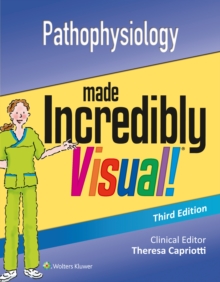| Description: | Select Guide Rating
Know the how and why of common conditions—and assess them accurately—with the newly updated Pathophysiology Made Incredibly Visual, 3rd Edition . Fully illustrated in the popular Made Incredibly Visual style, this essential guide offers easy-to-follow explanations for the causes and mechanisms of numerous common disorders, listing symptoms and indications for each. Use this as the perfect study guide for the NCLEX® or certification exam, to support class materials, and to absorb the pathophysiology principles every nurse needs to know. Absorb the expert wisdom and insights of this invaluable guide . . .- Walks you through the development stages of numerous diseases and disorders , illustrating their cellular process, symptoms, and effects on tissue and organs
- Explains cell parts and their functions , as well as cell division, adaptation, injury, and stress and disease
- Hundreds of photos, illustrations, and diagrams explaining key concepts and providing clear direction on how to recognize common conditions
- Supports accurate diagnosis and treatment – Common disorders for each major body system, such as:
- Cardiovascular – Acute coronary syndromes, aortic aneurysms, cardiomyopathy
- Respiratory – ARDS, asthma, chronic bronchitis, lung cancer
- Neurologic – Alzheimer’s, cerebral aneurysm, migraine headaches
- Gastrointestinal – Cholecystitis, cirrhosis, Crohn’s disease
- Musculoskeletal – Carpal tunnel syndrome, herniated disk, osteoarthritis
- Hematologic – Anemia, leukemia, sickle cell disease
- Immune – AIDS, allergic rhinitis, rheumatoid arthritis
- Endocrine – Adrenal hypofunction, diabetes mellitus, metabolic syndrome
- Renal – Acute renal failure, acute tubular necrosis, pyelonephritis
- Integumentary – Acne, burns, pressure ulcers
- Reproductive – Breast, cervical, ovarian, and prostate cancer
- Special chapter features:
- Vision Quest – End-of-chapter quizzes in the form of puzzles, riddles, and multiple-choice questions, to help you retain vital information
- Risky business – Risk factors to be aware of while treating each condition
- How it happens – The physiological process that creates a particular condition
- What to look for – A list of symptoms for each condition
- Age-old story – Discusses how a condition develops and presents, according to the patient’s age
- Memory board - Visual tricks that help you remember vital concepts and key treatments
Know the how and why of common conditions—and assess them accurately—with the newly updated Pathophysiology Made Incredibly Visual, 3rd Edition . Fully illustrated in the popular Made Incredibly Visual style, this essential guide offers easy-to-follow explanations for the causes and mechanisms of numerous common disorders, listing symptoms and indications for each. Use this as the perfect study guide for the NCLEX® or certification exam, to support class materials, and to absorb the pathophysiology principles every nurse needs to know. Absorb the expert wisdom and insights of this invaluable guide . . .- Walks you through the development stages of numerous diseases and disorders , illustrating their cellular process, symptoms, and effects on tissue and organs
- Explains cell parts and their functions , as well as cell division, adaptation, injury, and stress and disease
- Hundreds of photos, illustrations, and diagrams explaining key concepts and providing clear direction on how to recognize common conditions
- Supports accurate diagnosis and treatment – Common disorders for each major body system, such as:
- Cardiovascular – Acute coronary syndromes, aortic aneurysms, cardiomyopathy
- Respiratory – ARDS, asthma, chronic bronchitis, lung cancer
- Neurologic – Alzheimer’s, cerebral aneurysm, migraine headaches
- Gastrointestinal – Cholecystitis, cirrhosis, Crohn’s disease
- Musculoskeletal – Carpal tunnel syndrome, herniated disk, osteoarthritis
- Hematologic – Anemia, leukemia, sickle cell disease
- Immune – AIDS, allergic rhinitis, rheumatoid arthritis
- Endocrine – Adrenal hypofunction, diabetes mellitus, metabolic syndrome
- Renal – Acute renal failure, acute tubular necrosis, pyelonephritis
- Integumentary – Acne, burns, pressure ulcers
- Reproductive – Breast, cervical, ovarian, and prostate cancer
- Special chapter features:
- Vision Quest – End-of-chapter quizzes in the form of puzzles, riddles, and multiple-choice questions, to help you retain vital information
- Risky business – Risk factors to be aware of while treating each condition
- How it happens – The physiological process that creates a particular condition
- What to look for – A list of symptoms for each condition
- Age-old story – Discusses how a condition develops and presents, according to the patient’s age
- Memory board - Visual tricks that help you remember vital concepts and key treatments
|


